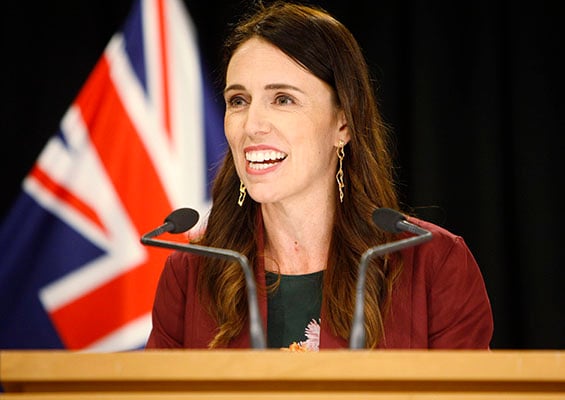Women account for 51% of the U.S. population, but only 33% of business owners with employees, and just 7% of all global leaders. But, during the COVID-19 pandemic, which is affecting 100% of the world’s population, despite their small numbers, women are making an impressive impact on mitigating the crisis.
Exploring key characteristics of female-led COVID-19 responses
Men and women are equally capable of global leadership. Recognizing equality should include a conversation about how the two genders have different leadership traits and behaviors that make them each successful. After all, the balance of inclusion and diversity is what can make our global economy thrive.
But during the current global pandemic, female-led responses are having an especially incredible impact on flattening the curve of COVID-19 and protecting communities. Let’s explore what global leadership characteristics have helped these leaders tackle the crisis and the stand-up responses that are making a difference.
Decisiveness
One response tactic that has proven successful during COVID-19 is acting quickly and decisively even if the decisions go against the ‘status quo.’
Look at Singapore's response to COVID-19, which is spearheaded by Singapore’s first female president, Halimah Yacob. Medical experts say Yacob’s “early diagnosis, isolation, contact tracing, and some very targeted mitigation steps" allowed the country to avoid the accelerated expansion that countries like South Korea, Italy, and Iran face.
Yacob was among the first leaders to take action, starting her response in early February. Yacob stood out as a renegade, as she took action while other governments were still debating whether COVID-19 was even real or not. One example of this hesitancy is shown in the United States’ response. President Trump initially failed to take the advice from top scientists for months, and now the U.S. is an epicenter of the pandemic.
Helpfulness
One of the Defining Leadership Principles at Berkeley Haas is Beyond Yourself, which means to shape our world by leading ethically and responsibly. As stewards of our enterprises, we take the long view of our decisions and actions. For that reason, the exceptional efforts Taiwan’s leader Tsai Ing-wen has shown during COVID-19 are especially impressive to us.
Taiwan’s early intervention measures controlled COVID-19 so successfully that Ing-wen and her team have been able to focus on helping other nations as well. Currently, Taiwan is exporting millions of face masks to help the European Union and others combat the pandemic and flatten the curve, globally.
Honesty
The current state of our world is uncertain: we don’t know how long the pandemic will last, we don’t know the rippling effects COVID-19 will have, and we don’t know how to stop the crisis.
Citizens are increasingly looking to leadership to answer difficult questions like:
- Do I have a job?
- Will I be able to pay my bills?
- When can my business open?
As difficult as it may be, everyone deserves honesty. Even leaders that don’t have the answers, can exude Confidence Without Attitude through honesty.
Germany's Chancellor Angela Merkel has been a model example for handling COVID-19, and much of her approach is based around honest communication; just think of her televised response to COVID-19 when she declared, “This is serious. Take it seriously.” Her honest communication and swift action have held the fatality rate of German citizens at 1.5%, which is significantly lower than other European countries: Spain (9.5%) and Italy (12%).
Conversely, Indonesian President Joko Widodo has admitted to deliberately withholding information about the outbreak to his constituents. Widodo said he did this to prevent panic. However, the approach may have set the country up to be under-equipped with medical supplies, and ill-equipped to collect accurate data on COVID-19 or assess the damage on its citizens.
Empathy
Maya Angelou famously said, “People will forget what you said, people will forget what you did, but people will never forget how you made them feel.” Berkeley Haas Professor Jenny Chatman reminds us of this quote when reflecting on COVID-19 and crisis management.
Chatman says, ”When people are faced with this kind of uncertainty, where bad things can happen, they want to know that you understand as a leader how difficult things are for them.”
That’s why the strongest leaders show reassurance, optimism, and hope, letting citizens know:
- I see you
- I understand that you’re scared
- I understand this is unprecedented
- I’m here for you
New Zealand’s prime minister Jacinda Ardern, is an excellent example of leadership through empathy. Arden has been praised for her empathic approach to leadership numerous times before COVID-19 struck, and amid this crisis, you can see Ardern’s empathetic approach once more.
While addressing her concerns over COVID-19, Arden said New Zealand needed to “unite against COVID-19" and called the country "our team of five million." Her empathetic communication, ability to encourage togetherness, and swift action have limited coronavirus casualties in her country to just nine deaths.
A non-politically charged example of empathy during COVID-19 is evident in the SheEO network of investors.
This group of female business leaders was recently featured in The Oprah Magazine for using empathy to support female-led businesses during economic uncertainty. By joining together to help one another, this network of women is “loaning each other money, resourcing how to crowdfund ways for them not to have to lay off their staff, supporting each other online and becoming each other’s customers.”
Exploring leadership at Berkeley Haas
While navigating this global pandemic has been challenging for many, we find encouragement by looking to the positives. Specifically, we want to celebrate how women have stepped up as strong, effective leaders during this time. We’re also excited to celebrate the women at Berkeley Haas who also showcase strength and determination every single day.
Berkeley Haas’ core values, Defining Leadership Principles, and Women in Leadership club are just a few ways that we help advance the path to leadership for women and make the celebrations for equality even louder.
Do you want to be a part of the movement too? Learn why The Financial Times named Berkeley a top-ranked MBA Program for women (#2 among U.S. schools and #3 in the world for women.) Discover the Berkeley Haas difference.









